Advanced Diagnosis and Treatment for Kidney Cancer
Comprehensive kidney cancer care with advanced diagnostics, expert oncologists, and personalized treatment at VS Hospitals.
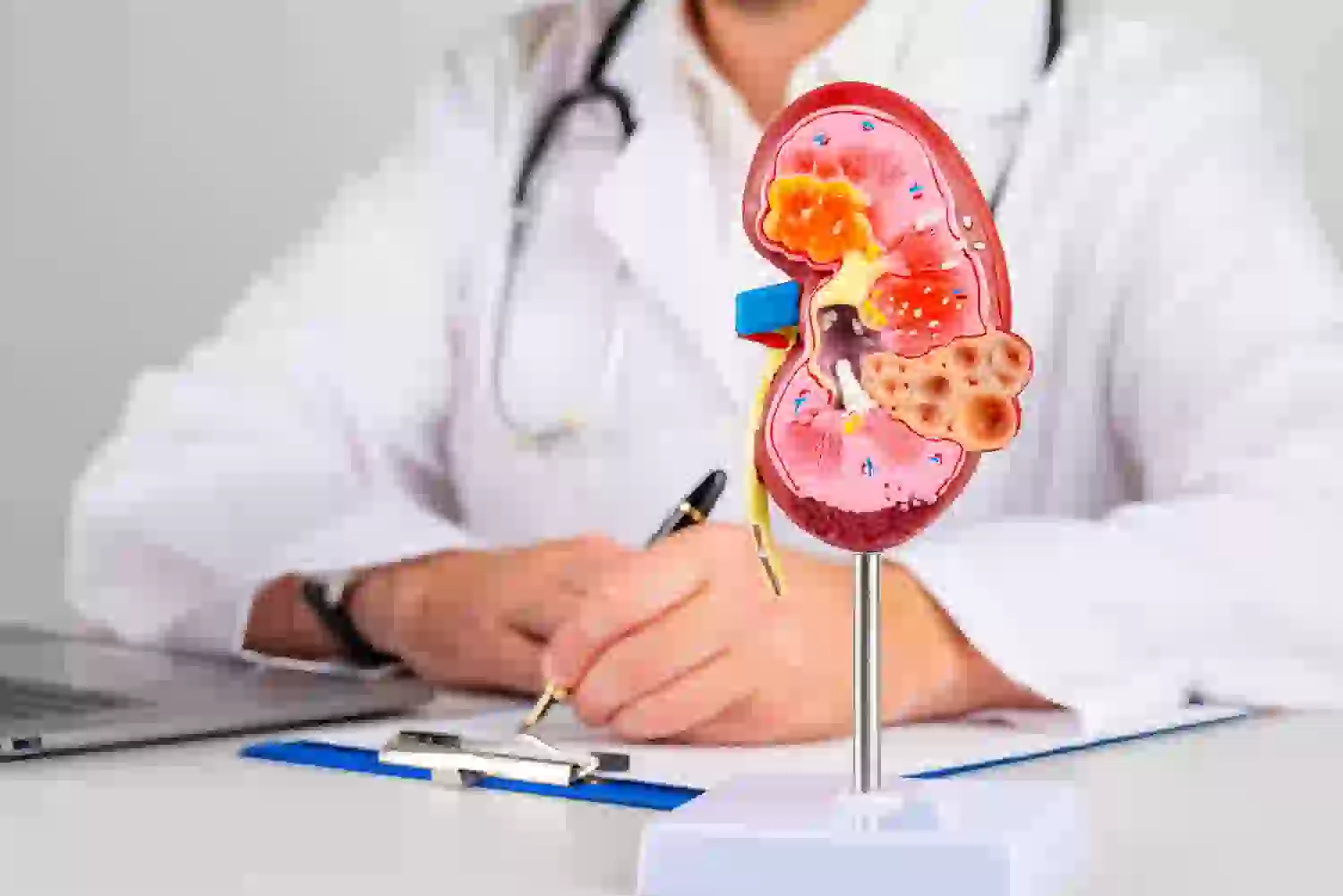
Kidney Cancer
Kidney cancer, also known as renal cell carcinoma (RCC), is a type of cancer that begins in the kidneys, which are responsible for filtering waste from the blood and producing urine. RCC is the most common type of kidney cancer and can develop in one or both kidneys. Although kidney cancer is relatively rare, early diagnosis and treatment can significantly improve outcomes. At VS Hospitals, we offer a multidisciplinary approach to diagnosing, treating, and managing kidney cancer, ensuring that each patient receives personalized care for optimal results.
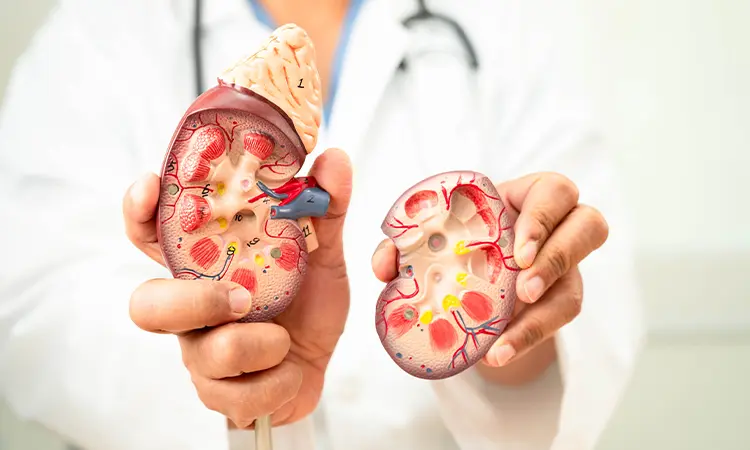
Early Detection Saves Lives
Early detection and treatment are crucial for improving the chances of survival. If you notice any concerning symptoms, consult a healthcare provider immediately.
Signs and Symptoms
Blood in the Urine (Hematuria)
One of the most common symptoms of kidney cancer is blood in the urine, which may appear as pink, red, or dark brown.
Pain in the Back or Side
A dull ache or pain in the lower back or side, particularly on one side, may occur if the tumor presses against the kidney or surrounding tissues.
Fatigue
Feeling unusually tired or weak, even with adequate rest, is common in individuals with kidney cancer.
Unexplained Weight Loss
Losing weight without trying, particularly if combined with other symptoms, can be a sign of kidney cancer.
Fever
Low-grade fevers, often occurring with no other explanation, can be associated with kidney cancer.
Swelling in the Legs or Ankles
In advanced cases, kidney cancer can cause swelling in the legs, ankles, or abdomen due to kidney dysfunction.
Loss of Appetite
A decrease in appetite, particularly in combination with other symptoms, may be indicative of kidney cancer.
Blood in Urine
Hematuria - pink, red, or dark urine, the most common symptom
Frequent Urination
Feeling the need to urinate frequently, even when bladder is not full
Painful Urination
Experiencing pain or burning sensation while urinating
Back or Pelvic Pain
Pain that occurs as the cancer grows and spreads
Unexplained Weight Loss
Significant weight loss not related to diet or exercise
Fatigue
Feeling unusually tired or weak without a clear cause
If you experience any of these symptoms, particularly if they persist for several weeks or worsen, it is important to seek medical attention for evaluation and possible screening.
Meet Our Expert Kidney Cancer Oncologists
Risk Factors
Smoking
Smoking is one of the leading causes of bladder cancer. Chemicals in tobacco smoke can damage the lining of the bladder, increasing the risk.

Gender
Men are at a higher risk of developing bladder cancer than women.

Chronic Bladder Infections or Inflammation
Conditions such as bladder infections and long-term bladder inflammation can increase the risk.

Exposure to Chemicals
Prolonged exposure to certain chemicals, especially those used in the dye industry, rubber production, and chemical manufacturing, increases the risk.

Smoking
Smoking is one of the leading causes of kidney cancer. Chemicals in tobacco smoke can damage the kidneys and increase the risk of developing RCC.

Obesity
Being overweight or obese increases the risk of kidney cancer, particularly in individuals with abdominal obesity.

High Blood Pressure
Chronic high blood pressure (hypertension) has been linked to an increased risk of kidney cancer.
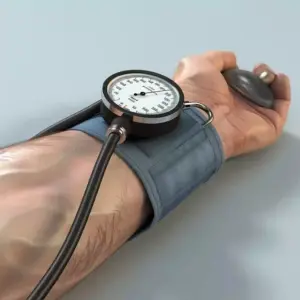
Family History
A family history of kidney cancer can increase the likelihood of developing the disease, suggesting a genetic predisposition.

Chronic Kidney Disease
People with chronic kidney disease, particularly those on long-term dialysis, have a higher risk of developing kidney cancer.
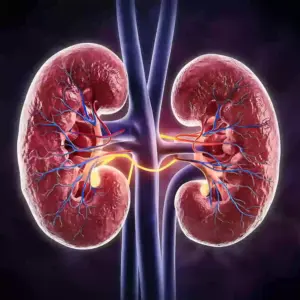
Genetic Conditions
Certain inherited genetic conditions, such as von Hippel-Lindau disease and hereditary papillary renal cell carcinoma, increase the risk of kidney cancer.

Gender and Age
Kidney cancer is more common in men than women and typically affects individuals over the age of 50.

Exposure to Chemicals
Prolonged exposure to certain chemicals, such as asbestos, cadmium, and some pesticides, can increase the risk of kidney cancer.
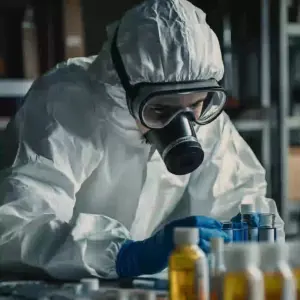
Workplace Exposure
Certain occupations, such as those in the petroleum, rubber, and mining industries, can increase the risk of kidney cancer due to exposure to hazardous chemicals.

Kidney Cancer
Diet and Nutrition
Prevention
Diagnosis
Key Services
Key Facilities
Diet plays a powerful role in both prevention and recovery from kidney cancer. Proper nutrition supports immune strength, improves treatment tolerance, and reduces the risk of recurrence.
- Focus on plant-based foods: Incorporate vegetables like spinach, carrots, and broccoli, rich in antioxidants that fight free radicals.
- Limit processed meats: Sausages and smoked foods contain nitrates linked to cancer formation.
- Stay hydrated: Adequate water intake helps flush toxins and supports kidney function.
- Choose lean proteins: Opt for fish, skinless chicken, tofu, or lentils instead of red meat to reduce kidney strain.
- Add healthy fats: Olive oil, avocados, and nuts contain omega-3 fatty acids that reduce inflammation.
- Avoid excessive salt: Too much sodium can elevate blood pressure, damaging kidney tissue over time.
- Cut down alcohol: Alcohol increases oxidative stress on kidneys and should be consumed minimally or avoided entirely.
At VS Hospitals, dietitians design personalized nutrition plans tailored to each patient’s stage of kidney cancer and overall health condition.
While not all cases of kidney cancer can be prevented, certain lifestyle adjustments can significantly lower the risk.
- Quit smoking: Stopping tobacco use immediately reduces kidney damage and overall cancer risk.
- Maintain healthy body weight: Regular physical activity and balanced diet help regulate hormones and metabolism.
- Manage blood pressure: Controlling hypertension through lifestyle and medication supports kidney protection.
- Avoid exposure to toxins: Wear protective gear when handling industrial chemicals or pesticides.
- Monitor kidney health: Regular medical check-ups and urine tests detect abnormalities early.
- Stay physically active: Exercise improves blood circulation and immune response.
- Limit over-the-counter painkillers: Long-term use of NSAIDs like ibuprofen may harm kidney tissues.
VS Hospitals promotes preventive oncology programs emphasizing education, lifestyle counselling, and annual screening for individuals at higher risk.
Diagnosing kidney cancer typically involves a combination of imaging tests, blood tests, and sometimes a biopsy. The goal of diagnosis is to confirm the presence of cancer and determine its size, location, and whether it has spread. Common diagnostic procedures include:
- Physical Exam: A healthcare provider may perform a physical exam to check for signs of kidney cancer, such as swelling in the abdomen or abnormal lumps in the kidney area.
- Urine Tests: Urine tests are used to check for blood or other abnormalities in the urine that may indicate kidney cancer.
- Imaging Tests: Imaging tests such as ultrasound, CT scans, and MRIs help doctors assess the size and location of kidney tumors and determine if the cancer has spread to nearby lymph nodes or other organs.
- Biopsy: A biopsy involves removing a small sample of kidney tissue, usually through a needle inserted into the kidney. The sample is then examined under a microscope to confirm the presence of cancer cells.
- Angiography: In some cases, angiography may be used to examine the blood vessels in and around the kidneys to evaluate the blood flow to a tumor.
- Blood Tests: Blood tests may be performed to assess kidney function and identify potential markers of cancer.
Accurate diagnosis using these methods helps doctors plan the most effective treatment approach, whether surgery, chemotherapy, targeted therapy, or immunotherapy.
VS Hospitals provides comprehensive services for diagnosing and treating kidney cancer, ensuring that patients receive the best possible care. Key services offered include:
- Kidney Cancer Screening: Regular screenings, including imaging tests and blood work, are available for individuals at high risk of kidney cancer, such as those with a family history of the disease.
- Surgical Oncology: Experienced surgeons at VS Hospitals perform kidney cancer surgeries, such as partial nephrectomy (removal of part of the kidney) and radical nephrectomy (removal of the entire kidney), using advanced minimally invasive techniques to minimize recovery time.
- Robotic-Assisted Surgery: For certain cases, robotic-assisted surgery is offered, providing greater precision and smaller incisions, which lead to faster recovery and fewer complications.
- Targeted Therapy: Targeted therapy is a treatment that focuses on specific molecules involved in the growth of cancer cells. This approach can be used for advanced kidney cancer to stop cancer growth or shrink tumors.
- Immunotherapy: Immunotherapy treatments are available to stimulate the immune system to fight kidney cancer cells. This treatment can be particularly effective in cases of advanced or metastatic kidney cancer.
- Chemotherapy and Radiation Therapy: Although not as commonly used for kidney cancer, chemotherapy and radiation therapy may be employed to shrink tumors or alleviate symptoms in advanced stages.
- Palliative Care: For patients with advanced kidney cancer, palliative care is provided to help manage pain and improve quality of life, focusing on symptom relief rather than curative treatment.
- Rehabilitation Services: Post-treatment rehabilitation, including physiotherapy and psychological counseling, is available to help patients recover physically and emotionally after treatment.
VS Hospitals is equipped with state-of-the-art facilities to provide comprehensive care for kidney cancer patients. These facilities include:
- Advanced Diagnostic Imaging: VS Hospitals uses the latest imaging technologies, including CT scans, MRIs, and ultrasound, for accurate diagnosis and staging of kidney cancer.
- Oncology Department: The oncology department at VS Hospitals is staffed with experienced specialists in kidney cancer, offering multidisciplinary care and personalized treatment plans.
- Surgical Suites: The hospital’s modern surgical suites are equipped with advanced technology, enabling precise and minimally invasive kidney cancer surgeries.
- Robotic Surgery Equipment: VS Hospitals offers robotic-assisted surgery for kidney cancer, providing patients with less invasive options, shorter hospital stays, and quicker recovery times.
- Chemotherapy and Radiation Units: The hospital provides dedicated chemotherapy and radiation therapy units, ensuring patients receive effective treatment in a safe and supportive environment.
- Patient-Centered Care: VS Hospitals emphasizes holistic care, providing private rooms, nutritional support, psychological counseling, and pain management to ensure that each patient’s emotional and physical well-being is supported throughout their treatment journey.
Top Medical Facilities at Our Multispeciality Hospital – Here’s What Makes Us Different!
Ready to Begin Your Kidney Cancer Care Journey?
Learn More About Kidney Cancer Care
Frequently Asked Questions
Common symptoms of kidney cancer include blood in the urine, pain in the back or side, unexplained weight loss, fatigue, fever, and swelling in the abdomen or legs. If these symptoms persist, it’s essential to seek medical attention for further evaluation and possible screening.
At VS Hospitals, kidney cancer is treated through a combination of surgery, chemotherapy, targeted therapy, immunotherapy, and radiation therapy. A personalized treatment plan is developed based on the type, stage, and location of the cancer.
While kidney cancer cannot always be prevented, lifestyle changes such as quitting smoking, maintaining a healthy weight, controlling high blood pressure, and staying physically active can reduce the risk. Regular check-ups and screenings for high-risk individuals are also essential for early detection.
